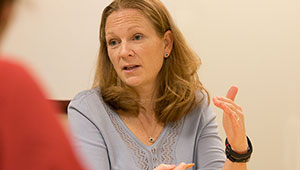Preventive Medicine
Research overview
Research is often lauded for finding life-saving treatments for diseases like cancer or diabetes. But consider the impact of preventing such illnesses from developing in the first place. It’s hard to describe the value of stopping illness or injury from happening. Yet that’s the goal of research on preventive care.
Most Kaiser Permanente Washington scientists study prevention, whether their work focuses on promoting health by influencing individual behavior, building sound prevention services into everyday clinical care, designing smart health coverage, or all three. By conducting their research at Kaiser Permanente Washington—which combines care and coverage—our researchers have access to data from a large, stable population over time, allowing them to discover which approaches to prevention work best.
Examples include research in areas such as:
Evidence-based practice reviews
A team of researchers at Kaiser Permanente Washington Health Research Institute (KPWHRI) produces reviews of scientific evidence that policymakers at the Centers for Medicare & Medicaid Services and the U.S. Preventive Services Task Force and others use in health care decision-making. We do this work as part of the Kaiser Permanente Research Affiliates Evidence-based Practice Center, one of 13 centers nationwide that are sponsored by the federal Agency for Healthcare Research and Quality.
Immunization
We’re improving the safety and effectiveness of vaccines through clinical trials, and we’re monitoring how well each year’s new flu vaccines are working. In addition, we’re studying ways to better inform parents about the benefits and potential harms of childhood vaccines, to improve their uptake.
Drug safety
We’re working on several fronts to help ensure the safety of prescription drugs and other medical treatments. For example, we play a leading role in the Food and Drug Administration’s Sentinel program to monitor the safety of medical products through routinely collected electronic health care data. We’re exploring ways to improve the safety of prescribing opioid pain medications. And we often study the safety of drugs commonly used to prevent chronic conditions like heart disease, cancer, and depression.
Screening
Prevention also includes screening to detect disease before symptoms appear, to identify and treat disease at an earlier stage. Our research is improving the effectiveness of cancer screening programs so people get the appropriate tests when needed based on their particular risks. Our research is also aimed at improving clinical screening for behavioral risks such as smoking, suicidal thoughts, alcohol use disorders, and poor eating and exercise habits.
Health promotion
Our research in areas such as smoking cessation, healthy diet, and chronic illness care finds new ways to encourage individuals to adopt and maintain healthier lifestyles. At the same time, we’re exploring ways to reach large populations through the use of phone-based programs, websites, and mobile technologies.
Recent publications on Preventive Medicine
Lee CI, Bogart A, Germino JC, Goldman LE, Hubbard RA, Haas JS, Hill DA, Tosteson AN, Alford-Teaster JA, DeMartini WB, Lehman CD, Onega TL. Availability of advanced breast imaging at screening facilities serving vulnerable populations. J Med Screen. 2015 Jun 15. pii: 0969141315591616. [Epub ahead of print]. PubMed
Chubak J, Hubbard RA, Johnson E, Kamineni A, Rutter CM. Assessing the effectiveness of a cancer screening test in the presence of another screening modality. J Med Screen. 2015 Jun;22(2):69-75. doi: 10.1177/0969141314562036. Epub 2014 Dec 9. PubMed
Beaber EF, Kim JJ, Schapira MM, Tosteson AN, Zauber AG, Geiger AM, Kamineni A, Weaver DL, Tiro JA. Unifying screening processes within the PROSPR consortium: a conceptual model for breast, cervical, and colorectal cancer screening. J Natl Cancer Inst. 2015 May 7;107(6). pii: djv120. doi: 10.1093/jnci/djv120. Print 2015. PubMed
Meenan RT, Anderson ML, Chubak J, Vernon SW, Fuller S, Wang CY, Green BB. An economic evaluation of colorectal cancer screening in primary care practice. Am J Prev Med. 2015;48(6):714-21. doi: 10.1016/j.amepre.2014.12.016. PubMed
Jacobsen KK, Abraham L, Buist DS, Hubbard RA, O'Meara ES, Sprague BL, Kerlikowske K, Vejborg I, Von Euler-Chelpin M, Njor SH. Comparison of cumulative false-positive risk of screening mammography in the United States and Denmark. Cancer Epidemiol. 2015 May 23. pii: S1877-7821(15)00103-4. doi: 10.1016/j.canep.2015.05.004. [Epub ahead of print]. PubMed
Researchers in Preventive Medicine
 Claire Allen, MPHManager, Collaborative Science |
 Melissa L. Anderson, MSPrincipal Collaborative Biostatistician |
 Julie Angerhofer, PhD, MPHAssociate Investigator |
 Paula R. Blasi, MPHSenior Collaborative Scientist |
 Erin J. Bowles, MPHDirector, Collaborative Science |
 Katharine A. Bradley, MD, MPHSenior Investigator |
 Meagan C. Brown, PhD, MPHAssistant Investigator |
 Jessica Chubak, PhDSenior Investigator |
 Nicole M. Gatto, PhD, MPHPrincipal Collaborative Scientist |
 Nora Henrikson, PhD, MPHAssociate Investigator |
 Annie Hoopes, MD, MPHAssistant Investigator |
 Paula Lozano, MD, MPHSenior Investigator; Director, ACT Center |
 Theresa E. Matson, PhD, MPHCollaborative Scientist |
 Dori E. Rosenberg, PhD, MPHSenior Investigator |
 Pamela A. Shaw, PhD, MSSenior Biostatistics Investigator |
 Kelsey Stefanik-Guizlo, MPHCollaborative Scientist |
 Yu-Ru Su, PhDAssociate Biostatistics Investigator |
 Karen Wernli, PhDSenior Investigator |











